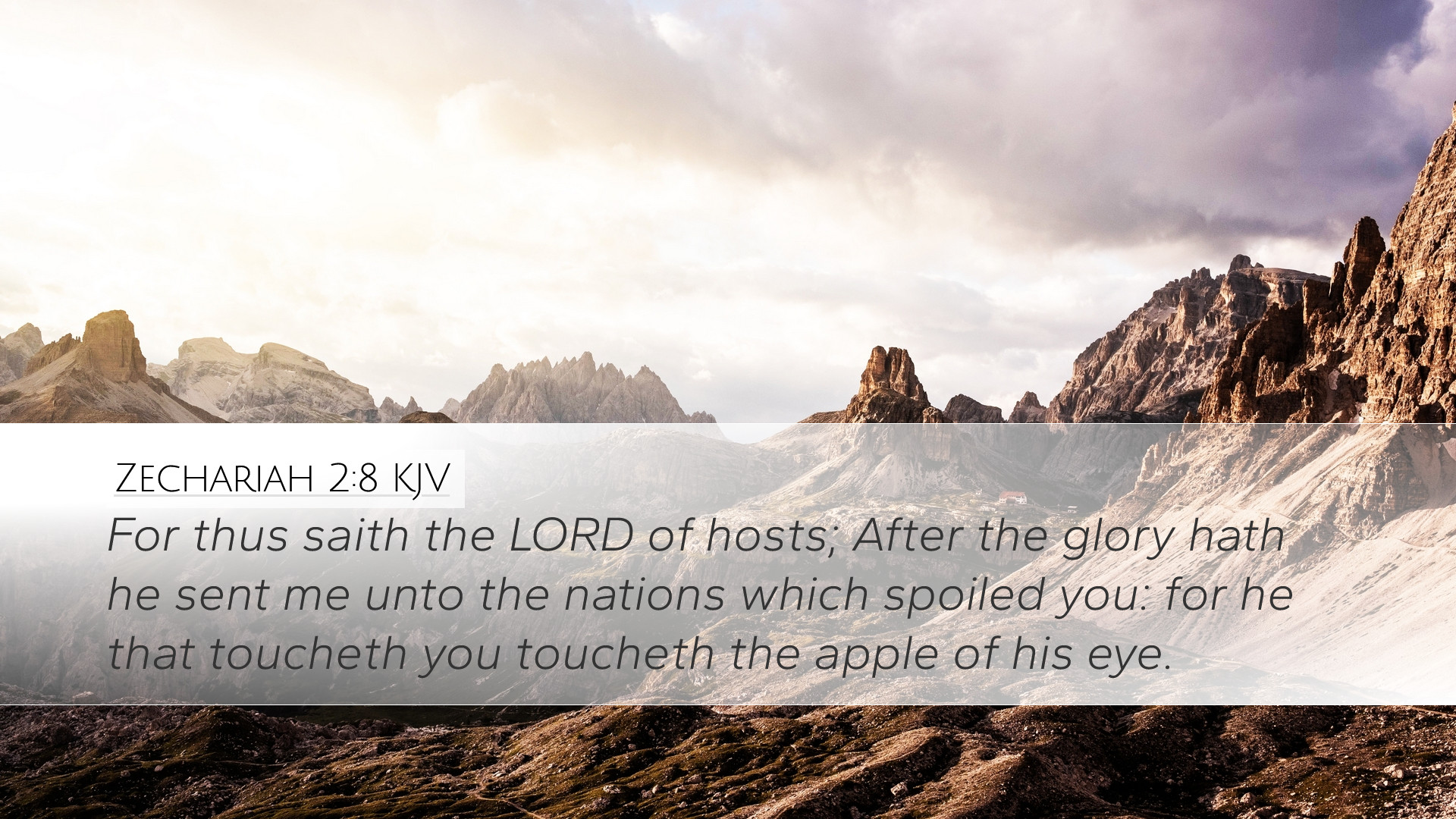Old Testament
Genesis Exodus Leviticus Numbers Deuteronomy Joshua Judges Ruth 1 Samuel 2 Samuel 1 Kings 2 Kings 1 Chronicles 2 Chronicles Ezra Nehemiah Esther Job Psalms Proverbs Ecclesiastes Song of Solomon Isaiah Jeremiah Lamentations Ezekiel Daniel Hosea Joel Amos Obadiah Jonah Micah Nahum Habakkuk Zephaniah Haggai Zechariah MalachiZechariah 2:8
Zechariah 2:8 KJV
For thus saith the LORD of hosts; After the glory hath he sent me unto the nations which spoiled you: for he that toucheth you toucheth the apple of his eye.
Zechariah 2:8 Bible Commentary
Commentary on Zechariah 2:8
Scripture Reference: Zechariah 2:8 (KJV) - "For thus saith the LORD of hosts; After the glory hath he sent me unto the nations which spoiled you: for he that toucheth you toucheth the apple of his eye."
Introduction
Zechariah 2:8 reveals profound truths about divine protection and the intimate relationship between God and His people. This verse serves as a powerful reminder that God's chosen ones are precious to Him, and any harm directed towards them invokes His righteous fury. Insights from esteemed commentaries can deepen our understanding of this significant scripture, providing historical context, theological clarification, and practical applications.
Historical Context
The book of Zechariah, written during the post-exilic period when Israel had returned from Babylonian captivity, addresses the spiritual and physical restoration of Jerusalem. The prophet Zechariah, alongside Haggai, encouraged the people to rebuild the temple and renew their covenant relationship with God. This specific verse highlights God's assurance towards His people in the face of adversities posed by neighboring nations.
Exegesis of Zechariah 2:8
Divine Messengers: In this verse, the phrase "after the glory hath he sent me" signifies the mission of divine messengers sent to both comfort and admonish. According to Albert Barnes, this implies that God’s messengers are appointed with authority to address the nations and enforce His will.
The Apple of His Eye: The metaphor "the apple of his eye" signifies those who are under God's special care and protection. Matthew Henry emphasizes that this expression denotes how God guards and cherishes His people, similar to how one instinctively protects their own eyes. Such imagery implies deep love and affection, reinforcing the idea of intimate relationship and vigilance of God over His people.
Theological Implications
Protection and Judgment: This verse underscores the dual themes of protection and judgment. God assures His people that those who harm them will face divine retribution. As noted by Adam Clarke, this implies that while God cares for His people, He will also act in justice against oppressors. This brings a dual message of comfort to believers and a warning to those who oppose God’s plans.
Application for Today
In contemporary context, Zechariah 2:8 serves to remind believers of God's ongoing oversight in their lives. It encourages leaders to recognize their divine protection amidst challenges. Here are some applications derived from the commentaries:
- Encouragement in Trials: Reflect on God's promise of protection during difficult times, remembering that adversity may be a pathway to spiritual growth.
- Righteous Living: The assurance of God’s presence compels believers to pursue holiness, knowing they represent His interests on earth.
- Evangelistic Zeal: Understanding that God has a plan for His people and those around them encourages active evangelism and intercession for those outside the faith.
- Unity within the Church: This command to uphold and protect one another resonates especially during times of internal strife and discord within the church body.
Conclusion
Zechariah 2:8 is a profound testament to God’s unwavering protection and love for His people. The insights from the esteemed public domain commentaries illuminate the text, revealing its historical relevance and timeless theological implications. In a world filled with uncertainties, this verse calls believers to rest in God’s care, assures them of His justice, and compels them to live in accordance with His divine purposes.


